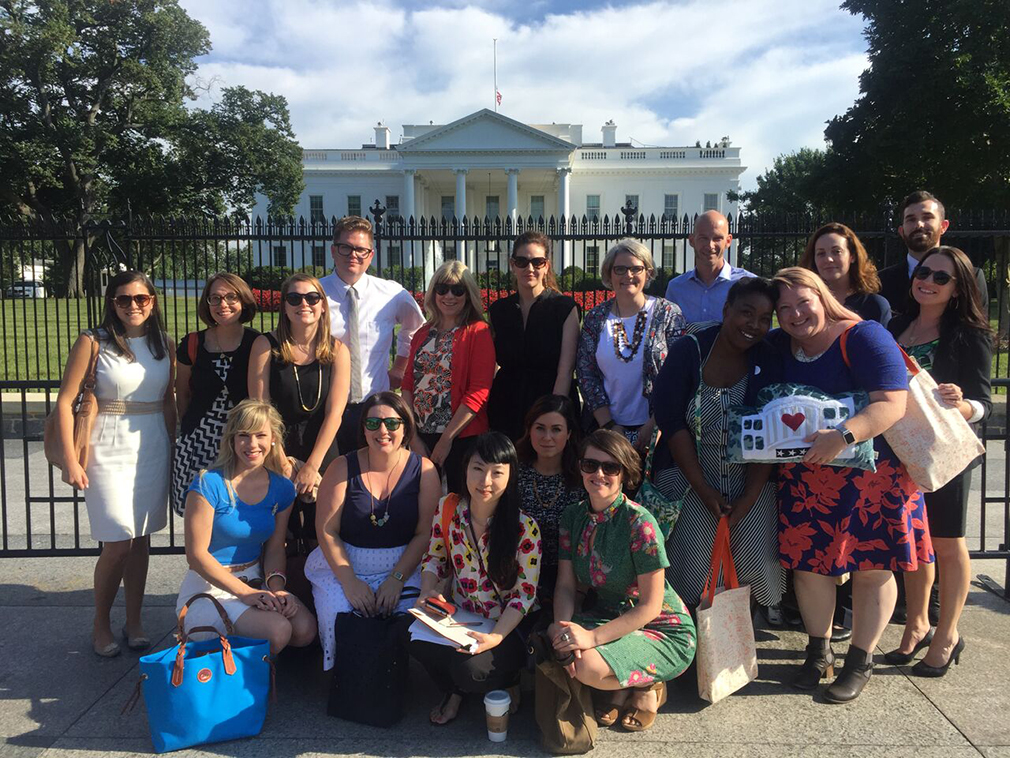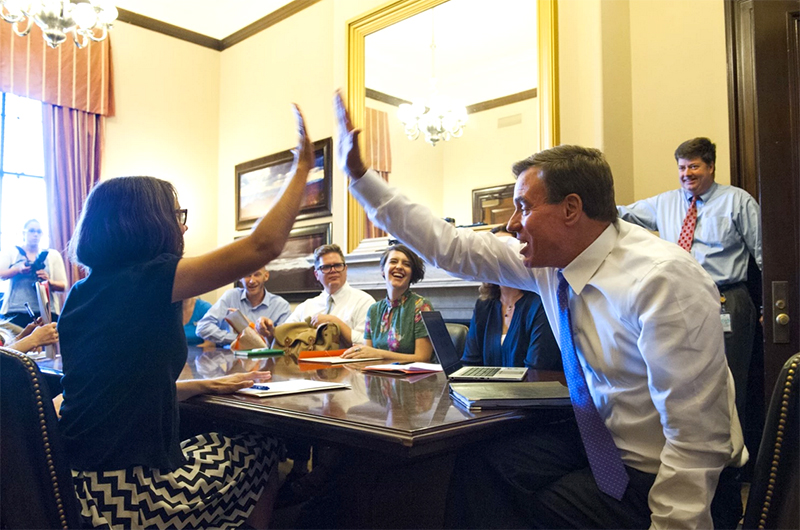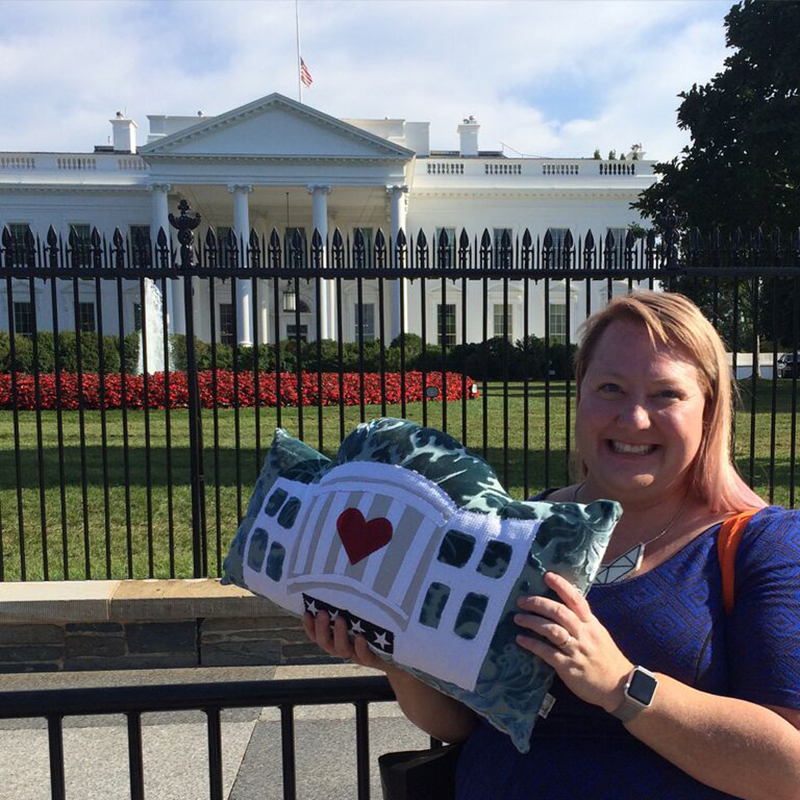
Etsy sellers and Etsy Admin employees during their trip to Washington, D.C., in July.
Photo courtesy of Sara Cohen
Cordelia Smith started selling her handmade soap at a farmer’s market near her home in Pueblo, Colorado in 1993. When her product began to catch on she decided to start a small body care company, Formulary 55. Soon she was taking wholesale orders from stores across the country. At the start of 2008 Smith set up an Etsy shop in order to sell her soap products directly to consumers as well. Since then the business has grown enough so that Smith’s husband, Anthony, left his job at Microsoft to work with her making soap and other body products full-time.
Formulary 55 has sells an average of 20 items on Etsy each day, over 18,000 in total since opening. Sales on her own website are strong as well so when Smith heard about possible legislation that would require online shops to start collecting sales tax from customers in every state she became very concerned.
“The bookkeeping related to capturing sales tax in all applicable areas will put a massive strain on makers, turning most of their day into bookkeeping and not making,“ Smith explained. “If the Internet sales tax issue isn’t dealt with in a manner that will make it easy for sellers to collect sales tax, it will really hamper small sellers ability to run their businesses.”
This summer Etsy asked Smith if she’d be interested in attending a lobbying trip to Washington where she could express her concerns to lawmakers directly. Smith jumped at the chance.
Etsy seller Rebecca Saylor was also invited to go on the lobbying trip. Saylor heads the Etsy San Francisco team and works with sellers every day. She was thrilled by the opportunity to help get their voices heard, although at first the idea of lobbying was off putting.
“Thanks to TV shows like Scandal, the words ‘lobbying in Washington’ conjure up visions of men in suits and shady back door deals,” she quipped.

Etsy makers meeting with Senator Warner in July in Washington, D.C.
Photo courtesy of Sara Cohen
Nevertheless, on June 22, Smith, Saylor and 12 other Etsy sellers flew to Washington D.C. to advocate before Congress for the needs of micro businesses. Over the course of two days, the group had 10 appointments and met with Sens. Ron Wyden (D-Ore.), Michael Bennet (D-Colo.), John Cornyn (R-Texas), and Bill Nelson (D-Florida) and Reps. Peter King (R-N.Y., 2nd dist.), Cathy McMorris Rodgers (R-Wash., 5th dist.), David Cicilline (D-R.I., 1st dist.), and Jason Chaffetz (R-Utah, 3rd dist.). Saylor was pleased to find that Etsy allowed sellers to speak freely about their experiences.
“Our focus was on how these issues impacted small Etsy businesses and to put a face to the 1.4 million Etsy sellers in our community,” Saylor says. “Throughout the day, I was constantly impressed that Etsy sat in the background, making introductions, then physically moving behind the scenes, letting the Etsy sellers take the lead on telling their stories and asking questions.”
Allowing sellers to speak directly to policy makers in their own voices was the goal of the trip says organizer Althea Erickson, Global Policy Director at Etsy. Erickson came to Etsy from an advocacy position at Freelancer’s Union where she’d spent years working on behalf of the self-employed. When Etsy created the position of Global Policy Director three years ago she was their first hire.
“Etsy was getting requests to weigh in on government issues and my first task was to make a recommendation on what we should be focusing on,” Erickson recalls. After extensive study she determined that plenty of comparable companies were already lobbying for tech-related issues, but Etsy had the unique opportunity to get Washington to listen to the issues facing micro businesses. “Businesses of one are often not represented in government. Etsy has 1.5 million sellers. We had the opportunity to be a powerful constituency,” she says.
Erickson doesn’t use the word “lobbying.” Instead she sees Etsy’s works in Washington as advocacy. “Lobbying is using interest groups to build influence, like hiring influencers who make campaign contributions. We’re not doing that. Etsy sellers are their best advocates and we just want to allow government to meet them. We’re not picking fights or playing inside baseball. We’re bringing our grassroots power to Washington. If we are successful our power comes from building a constituency of power to make change.”
Erickson has brought sellers to D.C. before to meet with ambassadors and do Hill briefings, but this was the first trip in which sellers met actually sat down with policy makers to address a specific set of issues. She approached the trip strategically beginning by choosing three urgent topics to target: internet sales tax, international shipping, and net neutrality. Next Erickson’s team honed in on policy makers working on each of these issues and then they set about finding Etsy sellers who lived in those policy makers’ states and districts.
Through phone conversations with those sellers Erickson was able to pull together a group of 14 who had a real stake in each issue. “Our goal was to form a diverse group of voices, a cross section of sellers who made different things, lived in different parts of the country, and dealt with these particular issues.”
Realizing that certain issues you face as a small business aren’t actually personal challenges to overcome, but are instead policy issues that could be addressed at a national level is a revelation for many small business owners, Erickson says.

Rebecca Saylor at the White House showing off a handmade White House pillow.
Photo courtesy of Rebecca Saylor
Etsy sellers tend to assume that dealing with international shipping tariffs, for example, is their own struggle. Each country has a threshold above which people receiving mail have to pay a duty. This minimum, called a de minimis, varies from country to country. In the United States, for example, it’s $200 while in Australia it’s $1,000. The de minimis in Canada is only $20. Dealing with these variations is a headache for small businesses and something Erickson feels can be best relieved through public policy changes.
“We’re working to push for a trade agreement that would set a higher and more universal de minimis worldwide or exempt one-to-one transactions like those between Etsy sellers and their customers,” Erickson explained.
In the meetings illustrator Jennifer Judd-McGee spoke to Congressmen about the difficulties she’s experienced shipping her work to international customers including shipping delays, tariffs, and long waits getting through customs. “I think it was good for the staffers to see that we as a group were a bunch of smart, professional people who were making tiny to small businesses work, sometimes in very rural areas, with success. Having been selling on Etsy for eight and half years now I really appreciated that they are putting all of this effort and enthusiasm into truly advocating for their sellers and understanding everyone’s particular concerns,” she says.
In her Etsy shop, Clementine, Cassie Gray sells gemstone and precious metal jewelry she crafts in her home studio in the rural town of Ashfield, Massachusetts. For Cassie, the spotty Internet access in rural areas like hers is incredibly frustrating and can at times be debilitating for her business. While in Washington Gray had the opportunity to testify before the House Subcommittee on Health and Technology.

Cassie Gray testifying before the House Subcommittee on Health and Technology.
Photo courtesy of Sara Cohen
“We still have a long way to go getting access to technology for those who need it,” she told the House Subcommittee. “I live and work in Franklin County which is the poorest county in Massachusetts. Most of Ashfield is completely without cell phone reception; in my house high on a hill I get just one bar of 3G. There is no broadband or cable available so I use a satellite to connect to the Internet. It’s slow and involves me having to go out in the middle of winter storms with a kayak paddle to whack the accumulated ice off the dish.”
Gray felt that being able to speak directly to Congressman Moulton who represents her district in Massachusetts really made a difference. “Congressman Moulton and his staff were warm and welcoming; he invited me to his office beforehand and we walked over to the Rayburn building where the hearing was being held together…I wanted to highlight the fact that having to rely on a satellite to run my business is a serious hindrance—and I do think that resonated.”
In the weeks after the trip Erickson has been fielding calls from Congressional staffers who are following up on the specifics of the issues raised. She’s especially excited to harness the enthusiasm and energy of the sellers who participated and is now working to help them engage politically on a local level. “Everyone left excited to continue to advocate,” she says.
Smith, the soap maker behind Formulary 55, certainly was. “Upon coming home from the trip, I was energized! I’m so inspired by the other sellers and so thankful for all the work Etsy Admin does on the small maker’s behalf,” she says.
Saylor felt empowered as well. “As we walked through Capitol Hill from meeting to meeting, we bonded together, warriors for small business,” she says. “Etsy really impressed me with this small act of confidence in its community and I was honored to be a participant.”
Do you have an Etsy Shop? Craft Industry Alliance members get access to our exclusive webinar by Etsy expert Sarah Sewell. Learn how to optimize your shop to increase traffic and sales.

Thank you Abby!
So often I’ve sent emails and called my congressional reps about the sales tax issues and pretty much figured I was on my own – I am thrilled to hear that Etsy is taking steps to make small business’ voices heard.
I am very interested in hearing followups to this June meeting and updates on Etsy’s continuing efforts on these and future topics.
I’d also be interested to hear of any news from Ebay about the same issues, particularly that sleeping dragon called the Marketplace Fairness Act or it’s offspring. I feel the internet taxation issue is probably the biggest problem facing small online business owners, more so because most folks think legislation will only apply to “big” sellers and not to them.
I hadn’t heard about the Marketplace Fairness Act, so thank you for bringing it to my attention. I can’t imagine the burden that would put on small businesses — would they be expected to file in every state? Dealing with the NY State website is hard enough…